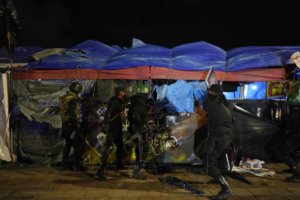While New Jersey lawmakers failed to advance a bill to study reparations for the state’s Black residents, private citizens are moving forward with their own effort in a series of public sessions starting this Tuesday.
The nine public hearings, focusing on the state’s history of slavery, will be held over the next two years and are being convened by the New Jersey Reparations Council, an initiative established by the New Jersey Institute for Social Justice, an advocacy group focused on racial and social justice.
In 2025, the institute intends to release a report combining the research gained during the listening tour with proposals for reparations in the form of both “programs and direct payments,” according to its website.
Jean-Pierre Brutus, senior counsel at the New Jersey Institute for Social Justice and a panelist at Tuesday’s public session, noted that New Jersey was the last northern state to abolish slavery. And while New Jersey is progressive in many ways, its history of enslavement and Jim Crow segregation has produced “some of the worst racial disparities in the country,” Brutus said.
“In order for us to move forward and build a stronger New Jersey and a stronger future, we need to reckon with our past,” he said.
According to a 2021 report by the Sentencing Project, Black New Jerseyans are imprisoned at a rate that’s over 12 times higher than that of white residents, a higher differential than in any other state. Additionally, 17.3% of Black residents and 17.9% of Latino New Jerseyans lived in poverty in 2019, compared to 6.7% of Asian and 5.9% of white residents, according to an analysis by the New Jersey State Policy Lab at Rutgers University.
While New Jersey is one of the nation’s most prosperous states, wealth distribution is also highly skewed, according to a 2022 report by the New Jersey Institute for Social Justice, which found that the median household wealth of white families is $322,500, but $17,700 for Black families and $26,100 for Latino families.
Despite the stark inequities, “the state remains unwilling to move forward a reparations study bill,” said Khalil Gibran Muhammad, a professor of history, race and public policy at Harvard University’s Kennedy School of Government. He’s also a resident of South Orange, New Jersey and the co-chair of the New Jersey Institute for Social Justice, which is launching the initiative.
“Our reparations task force is established to address all the key dimensions of historical reckoning, redistributive repair, and policy transformation to cease all forms of current structural inequality,” he said.
One of the experts scheduled to speak at the public hearing Tuesday is Beverly Mills, a cofounder of the Stoutsburg Sourland African American Museum in Skillman.
“New Jersey has pretty much had a long-standing reputation of not taking ownership of slavery,” said Mills.
“And never once did we learn about slavery in New Jersey,” said Mills, referring to her education growing up in the Garden State in the 1960s.
By 1830, New Jersey had more than two-thirds of the north’s slave population, and many of the state’s most prominent citizens were slave owners, said Elaine Buck, who along with Mills cofounded the museum and co-authored, “If These Stones Could Talk: African American Presence in the Hopewell Valley, Sourland Mountain, and Surrounding Regions of New Jersey.”
“The white founding families are still here,” said Buck, who is also scheduled to speak at the public session. “And they really have to come to grips with the fact that their ancestors owned our ancestors.”




